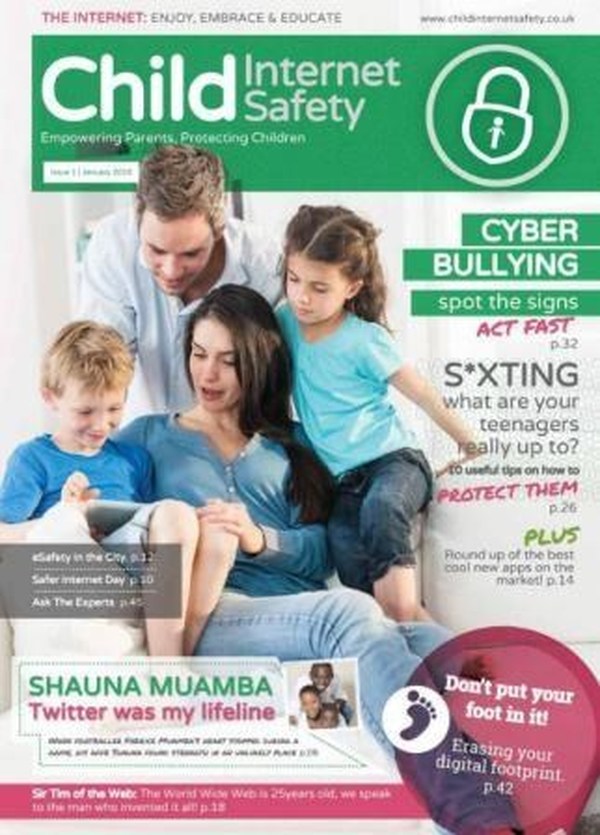Acceptable Use Agreements
Have a conversation
A simple and effective way to get involved with your children and their lives online is through discussion. By maintaining an open dialogue with your child and encouraging them to talk to you about their internet use parents can help children access the amazing resources the internet has to offer whilst keeping them safe online.
Conversation starter ideas:
- Ask your children to tell you about the sites they like to visit and what they enjoy doing online.
- Ask them about how they stay safe online. What tips do they have for you, and where did they learn them? What is OK and not OK to share?
- Ask them if they know where to go for help, where to find the safety advice, privacy settings and how to report or block on the services they use.
- Encourage them to help. Perhaps they can show you how to do something better online or they might have a friend who would benefit from their help and support.
- Think about how you use the internet as a family. What could you do to get more out of the internet together and further enjoy your lives online?
Family agreement
A family agreement is a great way to start a conversation with your whole family about how you all use the internet and discuss together how to behave in a positive way when online at home, at school or at a friends house. Our family agreement advice provides a list of things to consider when creating a family agreement and some examples. The family agreement template provides a framework that will help families set clear expectations for positive and safe internet use.
Internet Security
Parents often ask how they can monitor their children’s access to the Internet. There are various ways, including many different programs, to safeguard web users. However if your children are under ten, then it is advisable to supervise them closely whenever they are online. You can subscribe to child-friendly internet services, it may be worth contacting your provider to see what they have to offer.
online safety information Open to see more online safety information
Need advice setting online controls on PCs/laptops/tablets/phones with your internet provider then find out how at www.internetmatters.org
Online Control
There are also programs which block access to sites that are on a “bad” list, or ones which only allow access to sites that are on a “good” list. Programs that you could try include SafeSurf at www.safesurf.com
Some search engines can also be set to use a “family filter”, such as www.google.com.
Don’t forget that it’s not just websites you have to screen either: other internet programs like chat services and bulletin boards may include inappropriate material, and people can also send unsuitable emails to your children. Please remember that no program will screen all unsuitable material.
We direct the children to the ‘Think U Know’ websites to provide them with safe surfing guidelines. This website also has a section dedicated to parents and carers, click here to read more.
The website can also show you how to add tools to your search engines to protect your children
Digital Parenting and Mobile Devices
Parents need information and advice about the latest digital technologies and the kind of challenges your children might face in their digital world.
Download our compact Parent guide to keeping your child safe on line here
Vodaphone have a dedicated website to help parents feel more confident about supporting children in their digital world and even offer regular free magazines with great information and case studies that will help you get the lowdown on some of the key technologies children and young people enjoy – from apps and blogs to videos and Web searching.
They even have videos on social networking, mobile phones, games consoles so you can hear some expert views on young people and their digital world.
Need advice setting online controls on PCs/laptops/tablets/phones with your internet provider then find out how at www.internetmatters.org

Check out this great online magazine full of excellent guides, help and much more
Parents need information and advice about the latest digital technologies and the kind of challenges your children might face in their digital world.
Vodaphone have a dedicated website to help parents feel more confident about supporting children in their digital world and even offer regular free magazines with great information and case studies that will help you get the lowdown on some of the key technologies children and young people enjoy – from apps and blogs to videos and Web searching.
They even have videos on social networking, mobile phones, games consoles so you can hear some expert views on young people and their digital world.
Need advice setting online controls on PCs/laptops/tablets/phones with your internet provider then find out how at www.internetmatters.org
We’ve found a great site that helps parents engage with their child’s love of Minecraft. Click here to see the MineMum site.
Check out this great online magazine full of excellent guides, help and much more
WiFi at many places like Butlins, Starbucks, MacDonalds and various other sites where you see the Friendly Wifi logos are now approved under Friendly WiFi schemes. This means the public WiFi service at the venue is filtered to meet two levels of protection allowing children to surf the web safely. These filters are updated daily to give you and your family peace of mind. Click on either the logo above or the one below this text to find out where you can find friendly wifi when you are out with your children.
Internet user advice
The Internet is growing and changing all the time which can make it difficult to keep up with developments. There are some sites which can offer advice. Why not try www.bbc.co.uk/webwise/a-z
Childnet have some really great resources you can work with together – Smartie the Penguin -An e-safety story for 3 to 7 year olds
The CEOP (Child
Has someone acted inappropriately towards a young person online, or to a child you know? It may be sexual chat, being asked to do something that makes them feel uncomfortable or someone being insistent on meeting up. You can report it to CEOP below.
Cyberbullying
Children and school staff can be vulnerable to cyberbullying at any time or place via:
Email, Instant messaging (IM) and chat rooms -Sending abusive or nasty messages, including sending emails to others who join in the bullying.
Social networking sites, blogs –Writing upsetting comments on someone’s profile and/or about people on your own status updates or tweets. Uploading hurtful images or videos.
Setting up a fake profile dedicated to bullying someone else.
Online gaming –Abuse or harassment through multi-player gaming sites.
Mobile phones -Sending abusive texts, video or photo messages; encouraging someone to share intimate pictures or videos of themselves and then sending these on to other people (sexting). Note: where the images are of someone under 18, this is a criminal offence.
If you have any concerns regarding this subject please do not hesitate to talk to your child’s class teacher.
We have an informative leaflet you might find helpful, so click here to download it.
Click here to read the Government’s published document advice to parents on cyberbullying
The Government have published further documents that can be found here
We suggest reading the information on some of the links below for support:
Stay up to date and keep your child safe in today’s digital world
Digital Safety: Staying Safe Online
https://www.budgetdirect.com.au/blog/digital-safety-staying-safe-online.html



